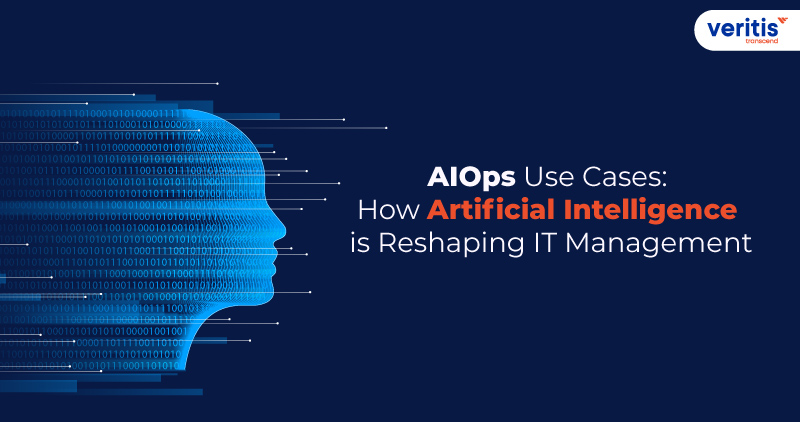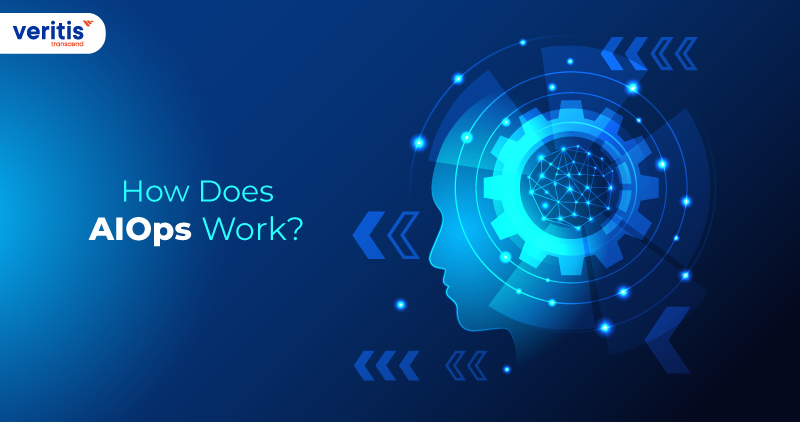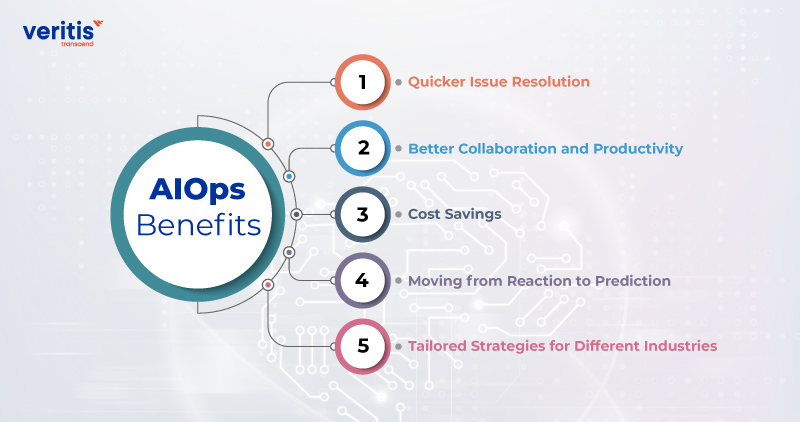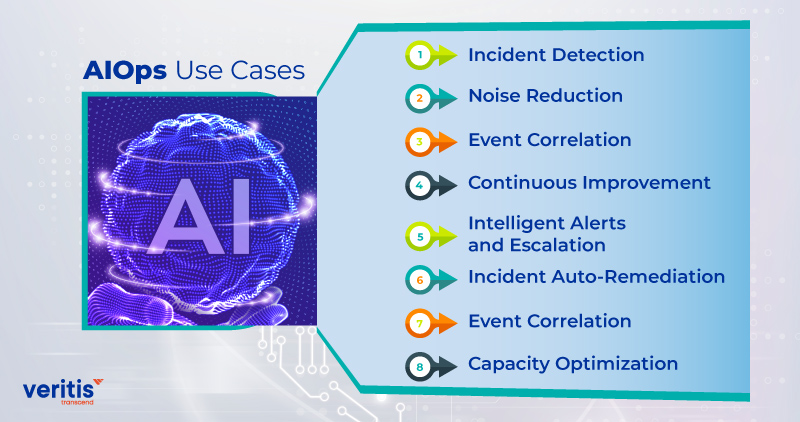
Not too long ago, IT was all about helping businesses run smoothly. But now, as people mainly interact with brands through digital services, IT has become a big part of the business. It needs to change quickly to keep up with what customers want.
Almost every business today relies on its digital services to work well and develop new innovative ideas. But finding the right balance between making things work and developing new ideas is getting more complex as technology changes.
However, these new ways of doing things can create much data that IT teams need help understanding. This makes it hard to find and fix problems quickly. It also means problems go unnoticed or take a long time to fix. This can make customers unhappy, cause delays, and stop new ideas from happening. Interestingly, the solutions to these problems are often hidden in the data. IT teams need help to connect the dots fast.
Artificial Intelligence for IT Operations (AIOps) solves this problem. AIOps platform uses intelligent computer programs and machines that learn to process and understand lots of data from all over a company’s IT system. It makes things less confusing by bringing all the data together and finding the essential parts. It looks for patterns and groups helpful information so IT teams can solve problems faster.
AIOps aims to help IT teams handle problems before they become significant issues. It wants to give IT teams the tools to stop problems before they happen. This can save time and make things work better. AIOps can also predict what might go wrong in the future.
AIOps are becoming more popular because they can help companies work better. Even though it’s still new, it’s not just a bunch of empty promises. Some of the first companies to use it are already seeing good results.
But what can AIOps do for big companies? How do they use it, and what could it do in the future? Let’s explore some important ways that AIOps can help.
What is AIOps?
Artificial Intelligence for IT Operations (AIOps) is an intelligent tool that assists companies in effectively managing their computer systems during this digital transformation era. AIOps platform employs intelligent computer programs and learning machines to oversee these systems continuously. It identifies issues by detecting deviations from the norm and can forecast potential problems, preventing significant disruptions.
Moreover, AIOps streamlines the workload for IT teams by categorizing similar alerts and messages to avoid overwhelm. It analyzes various events and deduces their significance, guiding IT teams on necessary actions.
How Does AIOps Work?

AIOps operates through three main steps: Big Data, Machine Learning, and Automation.
1) Big Data
In AIOps, an extensive data system is commonly used to gather data from different parts of your IT setup, like networks and applications. This data might include past performance records, real-time operations updates, system logs, and network information. For instance, if you run an online store, the data could include details about user visits and purchases.
2) Machine Learning
Once the data is collected, it’s sent through a process to teach intelligent algorithms how things work. This process includes three main stages: pulling out the correct info, getting it ready, and loading it up. For instance, if extra stuff in the data is not essential, this stage removes it, so the intelligent algorithms focus on what matters.
3) Automation
After the intelligent algorithms are trained, they start doing their job. They watch out for anything unusual or essential, like problems or changes. They can even help fix minor issues automatically or suggest ways to improve things. For instance, if something weird happens on your website, the system notices and informs the IT team. It can also do things like finding problems, mining valuable data, and giving alerts. This helps the IT team work better. The insights and suggestions from the intelligent algorithms are shown on screens to help the IT team make things run smoothly.
Useful link: How AI Adoption Will Transform Your Business
AIOps Benefits

AIOps improves team efficiency by saving time that would otherwise be spent sorting through system failure reports. It’s precious as it can catch problems before they become significant issues that affect the business or users. Adopting an AIOps platform approach offers several key benefits:
1) Quicker Issue Resolution
As the AI system becomes more advanced, it gets better at figuring out what went wrong and why. This means that teams can solve problems faster. For instance, in the case of web traffic problems, teams would deal with data already sorted out from unnecessary information.
2) Better Collaboration and Productivity
Teams become more productive because they don’t have to review logs to find problems. Once again, using the web traffic example, the AI operations system would recommend a solution for the downtime it triggered. Different departments can work together more effectively since they know which parts of the system are having trouble based on the filtered data.
3) Cost Savings
Costs are reduced in different ways. The time from a problem occurring to a solution being implemented is shorter, reducing downtime costs. Also, less staff might be needed with an AIOps system in place. Moreover, there’s less risk of losing revenue due to insufficient user experiences with the system.
4) Moving from Reaction to Prediction
Predicting what might happen next is a significant advantage for planning and budgeting. As the AI operations system learns from more data, its predictive ability improves, which is helpful for long-term planning.
5) Tailored Strategies for Different Industries
Different algorithms work differently with various data types. For instance, finance and e-commerce would have different needs for training models. These differences can be used to create more specific strategies. Moreover, companies in the same industry can use AIOps practices tailored to their requirements.
Useful link: 6 Ways AIOps Optimizes Cloud Security
AIOps Use Cases

AI for IT operations, or Artificial Intelligence for IT Operations, finds valuable applications across a spectrum of IT-related scenarios. It employs AI and machine learning to improve incident management, alert handling, capacity planning, security analysis, and other vital aspects of IT operations. These AIOps use cases enable organizations to work smarter and maintain robust IT environments.
1) Incident Detection
AIOps solutions come in handy for spotting issues well in advance. Take, for instance, its ability to identify unusual things happening in your systems before they become real problems. This proactive approach ensures you’re aware of potential issues long before they impact your customers, giving you more time to address them and maintain a smooth operation.
2) Noise Reduction
Alert fatigue is a significant issue when dealing with incidents. When you receive a flood of alerts, it’s easy to become overwhelmed and ignore them, even if some are important. The goal is to filter out less urgent alerts and group together those that are connected. AIOps strategy can help by organizing, reducing, and ranking alerts. This way, your team can concentrate on the most crucial issues that affect reliability.
3) Event Correlation
AIOps become invaluable in event correlation as infrastructure teams frequently receive numerous alerts, of which only a few hold real significance. AIOps solutions take action to differentiate these critical alerts, utilizing inference models to group them and identify the primary reasons behind the issue. This leads to infrastructure teams no longer being overwhelmed with alert emails and instead receiving just one or two genuinely essential notifications.
4) Continuous Improvement
Learning from past incidents, how things are going right now, and what users say provides valuable information for avoiding problems like those that happened before. This is vital for making ongoing improvements. AIOps tools use this knowledge to keep learning and become more intelligent, offering personalized connections, insights, and advice.
Useful link: Demystifying MLOps vs DevOps: Understanding the Key Differences
5) Intelligent Alerts and Escalation
Once problems are pinpointed through root cause alerts, IT operations (ITOps) teams use artificial intelligence to promptly alert the right experts or response teams for a speedy resolution. AI can even begin fixing the issue before human intervention is required. In many cases, AIOps tools continuously watch over hardware using machine learning, foreseeing errors based on past and current data before they happen. They then automatically send a detailed ticket with instructions on addressing the problem, ensuring you’re informed and equipped to tackle the issue.
6) Data Integration
Data from various sources seamlessly connects with your existing incident management tools and processes. The more data you gather, the brighter your machine learning becomes, offering more customized and helpful outcomes. An AIOps solution takes in this data, adds important information, and then notifies the appropriate teams or responders through the incident management tools they’re already familiar with. This eliminates the need for teams to waste precious time switching between different tools.
7) Incident Auto-Remediation
The seventh practical application of AIOps involves automated incident resolution. AIOps is a comprehensive link between IT services and operation management tools. Traditionally, IT service management teams have had to manually sort through infrastructure data to find and fix the main problems. AIOps simplifies this process by deducing the root causes from infrastructure alerts and sending them directly to the IT service management team or tool using integrated API pathways.
8) Capacity Optimization
The final AIOps application is all about making the most of your resources. This involves predicting future needs and using statistical analysis or AI-powered tools to ensure your applications run smoothly on your infrastructure. AIOps monitors usage, bandwidth, CPU, and memory to ensure your applications run efficiently.
Using AI, the AIOps strategy helps you manage your IT operations effectively while saving on your overall IT budget. It automates solutions in today’s intricate IT setups, making problem-solving much smoother.
Conclusion
AIOps is at the forefront of reshaping IT management, bringing automation, intelligence, and efficiency to the forefront. Esteemed organizations like Veritis, recognized as a Stevie Award winner, offer AIOps services that propel businesses into a new realm of IT excellence. These services empower companies to proactively manage incidents, streamline alerts, optimize capacity, and achieve operational excellence, ultimately delivering reliability, cost savings, and uninterrupted service.
Got Questions? Schedule A Call
Also Read:
- AIOPS Solutions: Enhancing DevOps with Intelligent Automation for Optimized IT Operations
- AI-Powered, ML-Driven – The New DevOps Trend!
- The Role of Artificial Intelligence in Business: Opportunities, Challenges, and Best Practices for CEOs and CTOs
- Strategic IT Consulting: Enabling Business Growth with Veritis’ Expertise
- Anomaly Detection with MI & AI : An Introduction
- All You Need to Know about Artificial Intelligence as a Service (AIaaS)